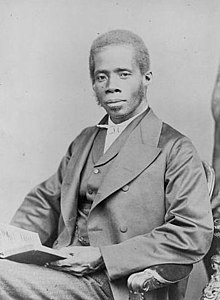Edward Wilmot Blyden
Edward Wilmot Blyden (born August 3, 1832 in Saint Thomas , Virgin Islands , USA ; † February 7, 1912 in Freetown , Sierra Leone ) was a Liberian statesman and Pan-Africanist of West Indian origin. In addition to Joseph Ephraim Casely Hayford , among others , Blyden is considered one of the leading figures of West African nationalism and Pan-Africanism.
Life
Blyden was born on the Caribbean island of Saint Thomas , then a colony of Denmark , as the third of seven children of tailor Romeo Blyden and teacher Judith Blyden. From 1842 the family lived in the Venezuelan port city of Puerto Cabello , where the boy developed a great interest in learning languages.
Even in his early youth, Blyden recognized the disadvantages and injustices towards African slaves as forms of colonial racism . After his five years of primary school education, which he completed again on the island of Saint Thomas, he entered the Bible Class of the Dutch Reformed Church from Reverent John P. Knox , who advised him in 1850 to study at the American Rutgers Theological College . Accompanied by
Misses Knox , he traveled to the United States . Despite the intensive support from the Knox family , he could not find a school there that would accept him, as there was no proof of university entrance qualification. He did not want to return to Saint Thomas either. By chance he became aware of the activities of the American Colonization Society (ACS) in New York , which was constantly recruiting emigrants to Liberia, and he arrived in Monrovia on January 26, 1851 . He first lived in the family home of the Americo-Liberian BVR James and attended the Alexander High School operated by the Presbyterian Church (Reverent David A. Wilson ) . With the support of Reverent Wilson , he worked alongside his school education from 1855 to 1856 as editor of the Liberia Herald . Due to health problems Wilson had to give up school service in 1861 and Blyden also took over his position as a teacher of Latin and Greek at Liberia College . In the spring, Blyden was given the opportunity to travel to England , Scotland , the USA and Canada , where, as Commissioner to the General Assembly of the Presbyterian Church in West Africa, he was the first African to meet the most influential representatives of the Presbyterian Church . After his return, he was “lured away” by the Liberian government and assigned to the Ministry of Foreign Affairs. He traveled several times in diplomatic missions to Europe ( Great Britain and France ) as well as to the neighboring colonial areas of Sierra Leone , Ivory Coast and Nigeria . He used the impressions and knowledge he gained there for his later academic work and in his political career as State Secretary (1862 to 1864) and Liberian Minister of the Interior (1880 to 1882).
In Monrovia , Blyden was a lecturer at Liberia College from 1862 to 1864 and was its director for four years (1880 to 1884).
The previous Liberian governments had severely neglected the country's economic development and accepted increasing foreign debt, which led to Liberia's first national bankruptcy in 1870 , which triggered a revolt by the Americo-Liberians against all state institutions and with the violent death of the economist as president elected wholesale merchant Edward J. Roye reached its peak. These events caused Blyden to go into temporary exile in Sierra Leone. After the situation eased, Blyden returned to Liberia and became Liberian Home Secretary during the presidency of Alfred F. Russell from 1880 to 1884. In the presidential election of 1884 he was defeated as a presidential candidate to his opponent Hilary RW Johnson .
Blyden then turned his back on active politics and devoted himself to his scientific work. Ever since his exile in Sierra Leone, he was concerned with the question of religious influence on Africans. From 1901 to 1906, Blyden took on a teaching position in Sierra Leone to train Muslim civil servants.
Fonts
Since moving to Liberia, Blyden has been one of the most ardent supporters of the American Colonization Society in Liberia, and as an insider he has provided the ACS-Journal African Repository with numerous articles and reports on the progress and increasing problems of Liberian society. As an author he wrote:
- A Voice from Bleeding Africa (1856),
- Hope for Africa (1861)
- Liberia's Offering (1862)
- The Negro in Ancient History (1869)
- The West African University (1872)
- From West Africa to Palestine (1873)
- Christianity, Islam and the Negro Race (1887)
- The Jewish Question (1898)
- West Africa before Europe (1905)
- Africa Life and Customs (1908)
literature
- Edward W. Blyden: Hope for Africa . 1861 ( limited preview in Google Book Search).
- Ralph L. Crowder: Edward Blyden: On the Struggle for African Liberation . In: Africa Unbound . Spring, 2010 ( full text as digitized version).
- Serafín Mendez Mendez, Gail Cueto, Neysa Rodríguez Deynes: Notable Caribbeans and Caribbean Americans: a biographical dictionary . Greenwood Press, Westport (CT) 2003, ISBN 0-313-31443-8 , Edward Wilmot Blyden, pp. 56–59 ( limited preview in Google Book Search).
Web links
Individual evidence
- ↑ a b c d E.W. Blyden "Biographical sketch". In: Hope for Africa (1861). Retrieved November 22, 2010 .
- ↑ a b c Blyden, Edward Wilmot. In: Encyclopedia of African-American Culture and History. Retrieved November 22, 2010 .
- ^ Title page of the first edition. Retrieved November 22, 2010 .
| personal data | |
|---|---|
| SURNAME | Blyden, Edward Wilmot |
| BRIEF DESCRIPTION | Liberian statesman |
| DATE OF BIRTH | August 3, 1832 |
| PLACE OF BIRTH | Saint Thomas , Virgin Islands |
| DATE OF DEATH | February 7, 1912 |
| Place of death | Freetown , Sierra Leone |
